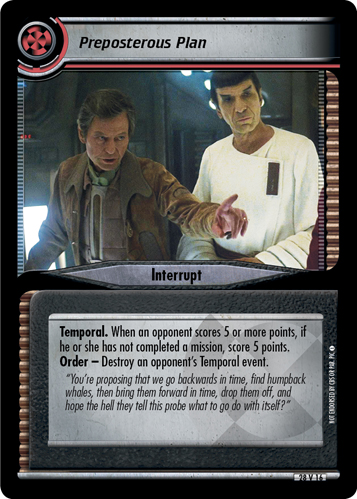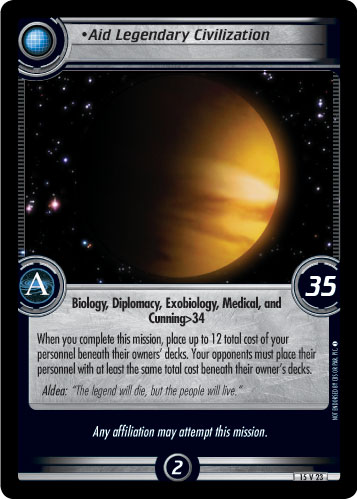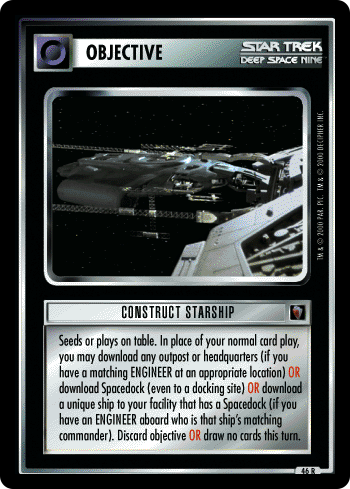|
Second Edition Heart of the Americas Regional winner Kevin Jaeger
Title: Chef's Choice
Headquarters: Earth, Cradle of the Federation and Mouth of the Wormhole, Deep Space 9
Deck Size: 42 cards
Deck Archetype: Speed Solver
Dilemma Pile Size: 23 cards
Dilemma Pile Type: Kill
Average Draw Deck Card Cost: 2.43
Agonizing Count: 2
Odds of Passing a 3-Skill-Dilemma Legacy: 6.8%
See also: Well, this deck uses the same two Headquarters as last week's deck from Stuart Motley, but it is perhaps closer to Ken Tufts' DS9 weenie deck.
|
|

Kevin's Commentary:
Why did you choose the deck that you used? What other decks did you consider using?
It's the fastest deck I've ever seen in 2e. Out attempting with 10 on turn 3 regularly or turn 2 with the nuts draw....And with beefy peeps not weenies that succumb to easy hate. I have another deck ready for Fargo regional. Just picked which order to play them in. I figured Jon the common core player would want to see thus deck in person.
What sorts of decks were you hoping to face while playing your deck? What decks did you hope not to face?
All of Stefan's supposed "bullshit five" since A: he's wrong and B: he's wrong and C: the European meta is stale. Those decks are not over-powered. Learn the difference. Stop complaining and get yourself in the lab. Innovate. Shift the meta instead of complaining. I want this deck to face everything. Only way to fine tune and make it better.
Prior to this tournament, did you have much experience playing this deck (or decks like it)? Did you learn anything new about it when you played it this time?
I've played the prep plan super boost before. The common core draws and emergency spends just give this deck extra kick. Saying that though, is Sarish Rez and Elizabeth Lense that make this deck viable by providing biology, exobiology, and medical redundancy.
Did you use any situational cards (cards that you wouldn't expect to be useful in every game)? Are there any whose usefulness exceeded your expectations? Were there any that you wouldn't include if you played the deck again?
The Tacking is the meta slot card. I might add the Alvera back in. Lots of options for minor customization.
What would you nominate as the MVP card from your deck?
The single These Are The Voyages is huge and Holding Cell is still clutch as one offs. But it's the Preposterous Plan that's the MVP of the deck giving me 10 to 15 points to burn early for explosive lines of play that tilt opponents who then over throw or under throw dilemmas.
|
|

My Commentary:
Shots fired! I would love to spectate a best of five between Kevin and Stefan; they are both superior deck-builders and players, a rare combination. It does not appear they've ever faced-off in tournament play; it'd be cool if that could change. Even a friendly series of matches over Lackey would be fascinating to me. Just need to figure out how to stream it on Twitch or something...
Anyways, aside from that, we've got a really interesting deck here. I've seen most the parts of it in action, but never the sum of the parts together. I know I've toyed with Inyo/Guinan, and Steve loved his Guinan/Preposterous Plan Cadet deck locally. I have not had a chance to experience the Common DS9 deck yet, but I am no stranger to draw-heavy speed decks. Historically, each part has been good, but not quite there yet. Ornate verb-reliant Inyo combos can falter to early prevention, weenies often run into 40 point mission-fueled buzzsaws, and if you include too much in the same deck, then you run the risk of not having anything work right.
This deck solves those problems by remaining pretty slim at 42 cards, and having the ability to draw through the deck quickly using the "Common" cards. In addition, Quark's ability to download any individual combo piece you happen to be missing is huge. Because Inyo provides a counter-agnostic boost, your personnel aren't going to worry about Unfair Terms or In Development ruining their day. Then you slam everyone into Aid Legendary Civilization, shuffle Inyo, Guinan, and Quark back in, and start all over again. What is craziest to me about Aid Legendary Civilization is that the decks best suited to counter its use are ones that might as well run it too, because they must have huge counter engine in order to beat it.
I actually got Kevin's interview answers back before I saw the deck, and had some fun trying to piece together what the deck must look like. Going to the lab to build something based on limited information was fun; my version of the deck uses Vintner for further download shenanigans. Maybe we should all spend some more time in the lab...
|
|
First Edition Heart of the Americas Regional winner Kevin Jaeger
Title: All those implants...you know thats really hard on the knees....totally impractical.
Deck Archetype: Interference/Assimilation
Play Engines: New Arrivals, They Will Be Coming, We Are the Borg
Draw Engines: New Arrivals, We Are the Borg, Strategic Base
Bonus Point Mechanics: Resistance Is Futile
See also: Matthew Ting won the 2015 Australian Nationals with a They Will Be Coming Borg deck (albeit a much larger one).
|
|

Kevin's Commentary:
Why did you choose the deck that you used? What other decks did you consider using?
I like playing Borg. I got a couple other decks I haven't played in sanctioned events yet, but I'll probably pick one to play up in Fargo.
What sorts of decks were you hoping to face while playing your deck? What decks did you hope not to face?
Nothing in particular to face or not face. I just like playing 1e and enjoy facing new decks.
Prior to this tournament, did you have much experience playing this deck (or decks like it)? Did you learn anything new about it when you played it this time?
Yeah I think I've played Borg once or twice. The only thing I've learned is that design needs to find new things for the Borg to do. It would really be nice if errata would finally remove the Borg ship clause from temporal vortex so retasking can be a thing.
Did you use any situational cards (cards that you wouldn't expect to be useful in every game)? Are there any whose usefulness exceeded your expectations? Were there any that you wouldn't include if you played the deck again?
The deck is the deck. It gets minor tweaks as time goes on but it's less about meta choices as it is... efficiency... of course...
What would you nominate as the MVP card from your deck?
Mvp goes to construct starship because why not.
Do you have anything else you'd like to say about your deck?
Nothing more about the deck. Just tell design to stop forgetting about Borg players please.
|
|

My Commentary:
Much of what I said about the 2014 version of this deck remains true today. I'd like to think that, at this point I'm pretty good a spotting Borg decks in the mission phase - now, looking at the mission selection, its Borg-ness seems obvious to me (I'll try not to announce it so loudly next time Josh, sorry). New Arrivals is still the engine of choice for aggressive decks that seek to overwhelm the opponent in any way besides manpower. Post Garrison was used at a homeworld in Kevin's game against Jon - being able to block a deck from their safe mission, even if they are able to Genesis Effect a Dead End away, sounds brutal.
Buried Alive makes an appearance here, though I've got an easier time figuring out why an aggressive deck would like it. Borg decks already love Mission Debriefing, since it has no effect on them, but makes many dilemmas more effective at stalling. If Scows can be Borg staples for their unavoidable ability to end mission attempts, then Buried Alive could certainly find a home with the hive. It wouldn't just be popular for the guaranteed stop though - adding a space icon to missions has increased utility when you're trying to make your opponent's personnel more vulnerable. Personnel on planets don't get wiped out all at once when the ship they are on vanishes. They need to be removed using slower personnel combat (though Assimilate Species certainly speeds up the process). Just force some of them on a ship, blow it up when it gets Cytherianed or whatever, and assimilate the remaining resistance.
I think that the main reason why the Borg have not seen much love from design lately is that they already seem to have so much. They have huge, fortress-like, mobile-reporting ships; though they have skill holes, they're great with the skills they have though skill-sharing (and Adapt: Negate Obstruction for the rest); access to backwards compatible AU-icon drones makes them one of the best affiliations at busting Quantum Incursions; they have multiple routes to a two-mission-win; they can run both competitive interference decks and solver decks. When the Borg aren't in the top 3 at major events, it is usually because no one played them. That's not to say that they can't get new toys, but doing so is trickier than giving stuff to, for example, the Mirror Quadrant factions. Of course, now those Mirror groups are genuine threats to win major events, so I look forward to seeing who's next.
|
|
Second Edition London Regional winner William Hoskin
Title: Boom boom boom boom!
Headquarters: Qo'noS, Heart of the Empire
Deck Size: 55 Cards
Deck Archetype: Midrange Solver
Dilemma Pile Size: 38 Cards
Dilemma Pile Type: Unfair Comparison
Average Draw Deck Card Cost: 2.63
Agonizing Count: 3
Odds of Passing a 3-Skill-Dilemma Legacy: 3.4%
See also: This is our first Klingon winner this year, but Johannes Mette won last year's German Nationals with a similar Midrange Klingon solver.
|
|
Will's Commentary:
Why did you choose the deck that you used? What other decks did you consider using?
I was looking at the decks that I had played against and that I thought would see play, as mentioned in a few previous articles, like Voyager 5 space, Dominion point loss, Romulan unstopping, and a couple of new decks that I haven't played against like the new starfleet and maquis decks. So my initial thought was battle, then I looked for a deck that had enough Leadership people and would usually have two ships in play which narrowed it down to Klingons or Voyager. I know there's a couple of different voyager battle decks, Johannes Klarhauser used to pilot a very dangerous one and Stefan Slaby has a very effective 5 Space voyager battle deck. Now for Klingons there have been a few but the ones I remember are Neil Timmons' and Ben Hosp's decks, so which way do I go? Well a few years back, I had a fairly effective Klingon speed deck. So, I decided to get that out and see what adding battle did to it. A quick look at the size of the deck one built and I decided it was too much. With 85 total cards I would never get the cards I was after. With only a few hours of deck building time left before I had to make my final decision, I removed the battle cards and put in a trick or two that you wouldn't normally see in this deck, but more about that later.
What sorts of decks were you hoping to face while playing your deck? What decks did you hope not to face?
I was expecting to see two continental champions, Mr Slade and Nick Yank and a slightly unknown quantity: Thorsten Wanek. As Matt's continental winning deck had received some errata, I guessed he would fall back on his reliable Relativity deck. It was a roll of a die to see which deck Nick would play, Dominion point and range loss, Khan, or Romulan. Thorsten has recent moved over to London with Sandra (I hear it's so that could he get to Worlds 2016 easier); in my opinion Thorsten could be playing anything from a Worlds-winning deck to a newly built, never before seen deck. I never enjoy playing against Borg assimilation, which Nick has in his range of decks, but don't think people will play that for a while. A well-hidden battle deck can cause major issues as well.

Prior to this tournament, did you have much experience playing this deck (or decks like it)? Did you learn anything new about it when you played it this time?
I had played a similar deck a few years back and actually took it to Australia for Worlds in 2012, but lost out in the final to Chris Clarke's errata-heavy deck. The deck had stop prevention (Worf), kill prevention (Gowron), skill gaining (Riker), high stats, and high cost playing cheap with a tight skill set. I added some dilemma support (9 cost event for Gorgan) and some secret identity protection(Jean-Luc Picard). I learned to check the cards I got out; as I found out on the way to the tournament I had forgotten to include Chang, who is very useful. After hastily removing him from the deck list and cursing myself, I just had to get on with it. I also forgot to change the deck title after removing the battle.
Did you use any situational cards (cards that you wouldn't expect to be useful in every game)? Are there any whose usefulness exceeded your expectations? Were there any that you wouldn't include if you played the deck again?
Dilemma-wise I had added Gorgan and it really slowed everyone down enough even after one of my games where I played it and my opponent looked at his hand and said with a grin, "what you discarding?" Thinking he could match my big ship, but falling to the 9-coster.
What would you nominate as the MVP card from your deck?
Well the thing about this deck is there is no "one" mvp. If you concentrate on one of them, the other four jump to the fore and knock you out. The deck can play differently each game and you just have to go with it.
Do you have anything else you'd like to say about your deck?
Worlds is being held in London this year. So if you're reading this and have always wanted to go to either Worlds or London, now is your chance. London is an amazing city with thousands of things to do. So if anyone wants to do some sightseeing or just relax and have a drink, let Nick Yank or myself know and we will make some suggestions and may even join you. Hope to see you all in September in London.
|
|

My Commentary:
Klingons are one of those affiliations that are perennially good. However, since we haven't seen many new toys for them recently, and people are naturally tired of using their old tricks, it's easy to forget how good they are. Then someone like Will resurrects an old build like this one and people are caught unprepared.
Though the Klingons are aggressive by nature in the shows, they make for great solvers in the game. Klingon personnel have some of the best solving abilities baked in, abilities that other factions would need to bloat their decks by including interrupts and events just to approximate. I imagine that designer's original goal in making personnel like Gowron or Riker or Klag was to free up deck space for those multitudinous Klingon interference cards. Certainly, many players have taken advantage of that; Neil Timmons' first World Championship win utilized a Klingon battle-heavy deck. But instead of using interference cards, you could always supplement those powerful solving personnel with potent interrupts like Bridge Officer's Test, The Promise, and Relentless and just be even better at busting though dilemmas.
It's very interesting to me to see an Unfair Comparison pile matched with a deck that is not that heavy with core events. The 6-cost 40-point mission dilemmas certainly keep the average cost above that of the average attrition or kill (or certainly Chula) pile, but if you see 40 point missions and events on the other side of the table, you'll want to be careful about throwing out those Unfair Comparisons. However, in a 38 card pile like this one, you'll often be able to pass them up for some other option. In a time where fast decks often have personnel with high printed cost (see Kevin's deck above), I like to think of Unfair Comparison as the other half of the anti-speed dilemma puzzle. In Development and Unfair Terms will be great against some of the speed decks, but for the rest (which often avoid 40 pointers and core events), there's Unfair Comparison. Just make sure you're still fast enough to beat the decks that do beat your average dilemma cost.
|


















